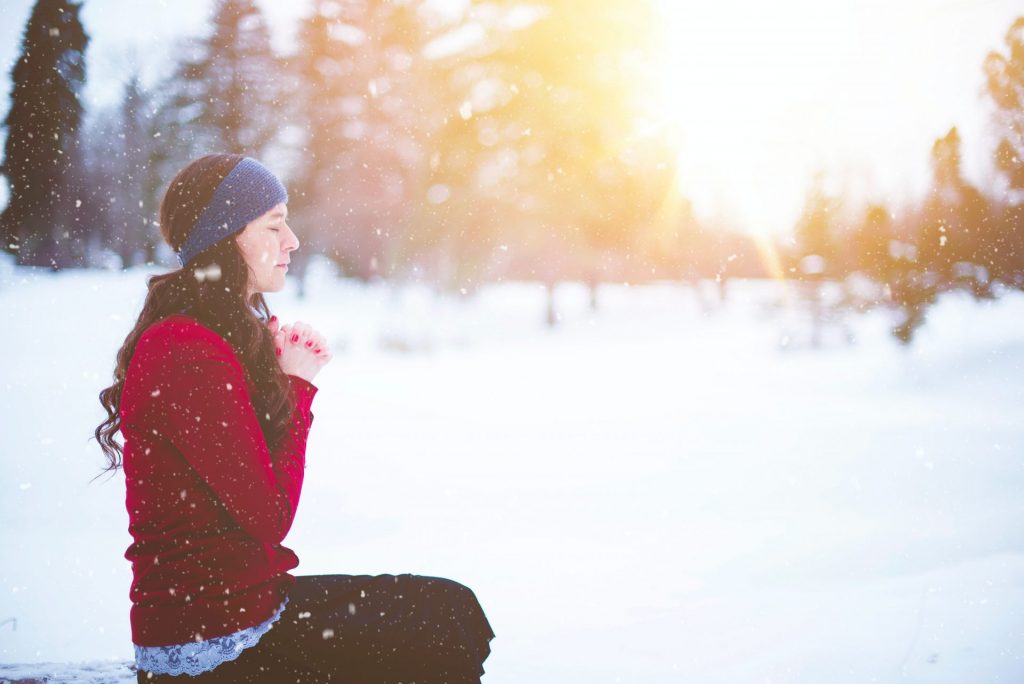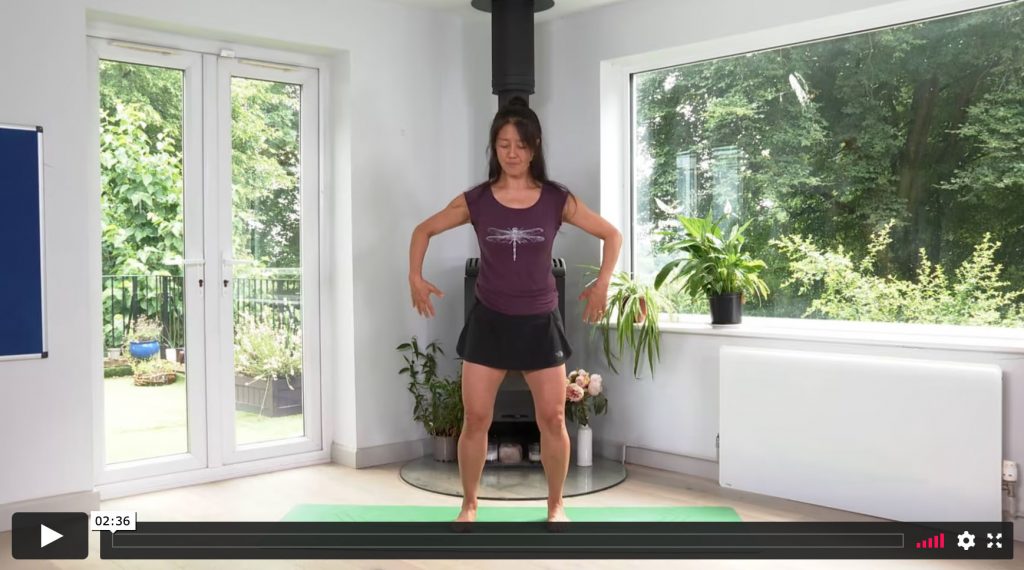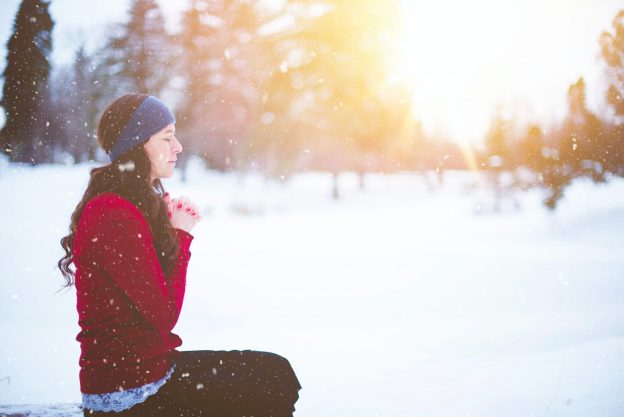
Mimi Kuo-Deemer and Rakhee Jasani explore how the special and unique qualities of winter can have a profound impact on our wellbeing. If you feel the call of the duvet this wintertime, and you find the pairing of short days and long nights especially hard, don’t be afraid to embrace winter. Winter is a time when nature tells us to go slow. Find out the winter practices to support you.
For many years, I found winter exhausting. Pairing busy work days with invitations to parties, buying gifts and burning the candle at both ends left me with a feeling of letdown in January. One January, a few years ago I attended a workshop with Mimi Kuo-Deemer exploring Qigong for winter practices. I began to glimpse what it might mean to approach winter as the season of maximum yin. The last couple of years have really helped me understand in a more embodied way, what it means to experience deep winter. Some of that winter has been an enforced sense of lying fallow through the pandemic, but I have also gained a deeper insight into the impact that this deep quiet can have and the changes and transformation it can bring about.
I have continued to study with Mimi since that first workshop as the snow fell many years ago and have continued to deepen my understanding. In this conversation, I asked Mimi how working with the seasons can enhance our enjoyment of the seasons. The questions are mine and the answers are Mimi’s
How can we understand ourselves through nature and its seasons and elements?
Winter, falling at the end of the year, corresponds to the element of water. It marks the fifth season in Chinese Element theory, which believes each element corresponds to a season as well as the organ and meridian system of the body. The elements and organ systems, like the seasons of the year, move harmoniously between energies of yin and yang.
The relationship of yin and yang is a way of looking at the world as a way of balancing opposites that are part of a whole. At a time of maximum yin, you will always find a seed of yang within it, and vice versa. They are never separate.
You can see this in nature: even in the coldest, darkest days of winter, trees have buds starting to form and grow.
We can see ourselves like this too: each of us is a microcosm of the macrocosm. If nature is balanced and whole, the Chinese model for health sees the human body as having that same potential. All we have to do is embrace this and realign with it to come back into balance and discover optimum health.
Can you say a little more about winter and qigong?
In Chinese medicine and qigong, winter is a time for storing rather than expending energy. Summer is marked by maturity and growth, or energy rising upwards. Winter is a time of a natural drawing inwards and downwards, a tendency we can observe in the natural world. Plants store up resources through their root systems, waiting for spring for their next burst of growth. Nature shows us the wise way to be: we should follow a period of busyness with a time for deep rest. Winter is the time to go slow. By living with the cycle of nature we begin to understand that rest is not a shortcoming; rather it nourishes our capacity for deep listening and allows us to nurture a deeper wisdom. It’s natural to want to draw inwards at a time when temperatures are cold, our movement is slowed down and our days are shorter.
How does this tie into the five elements that inform this way of looking at the world?
Water in the Chinese Element model reflects ideas of humility, fluidity, soft strength and creativity. It flows to the lowest places people disdain, and nourishes all things without asking for anything in return. Over 60% of our bodies are made up of water and 70% of the earth’s surface is covered in this element. Water is malleable: it is liquid and flowing, or manifests as solid ice or vaporises as steam. The following description of water comes from the Tao Te Ching:
“Nothing in the world is as soft and yielding as water, yet for dissolving the hard and inflexible, nothing can surpass it.”
In our bodies, this element is associated with the kidneys and urinary bladder, organs associated with deep stores of life energy. We can understand water as having a cooling quality: a pooling of tranquility and of drawing downwards. This is as opposed to the qualities of fire which are perfect for upward growth generated by heat. When the element of water is in balance in our bodies, we should feel a fluidity and in the flow. When out of balance, we could feel either sluggish or stagnant or perhaps forceful like a raging torrent.
What’s the link between winter and deep listening?
Each element in Chinese medicine has an associated sense organ and for water it is the ear. Winter is the perfect time for deep inner listening. The Chinese character for ‘to listen’ includes the radicals for the heart, the eye and undivided attention. Listening therefore has a heart quality. Many traditions include listening to silence as a deeply spiritual practice. Think of Buddhist meditators, yoga practitioners, Quakers and Catholics.
Winter and Deep Listening
I started this piece by saying that I used to find winter exhausting. I still feel tired when we get to winter, but I view it in a different way. Winter is an invitation to slow down; to give in to the slimmer light. I make the most of each day and do my best to match the rhythms of nature. In the mornings, I get out into the daylight, making the most of whatever sunlight filters through. In the evenings, I try and finish work earlier, eat earlier and get cosy. Embrace winter by spending time doing less, dreaming, staring at candlelight, maybe doodling, I notice that I enjoy winters more. I change my yoga and qigong practice too. It isn’t all about restorative yoga, though I do slow down. I like to start with lovely gentle joint awakeners and then to add in twists and backbends to feel warmth.
My qigong practice becomes more introspective: I spend longer in more meditative practices. I love to journal and explore the qualities associated with water and winter. I think about the place of fear and courage in my life and how I might listen more closely to what I need.
How to embrace winter practices
If you’re inspired to embrace winter, why not try Mimi’s Qigong balance series. It’s a fantastic way to explore bringing greater balance into your life.

On 2 January 2022 join Rakhee for an intention setting workshop





Leave a Reply